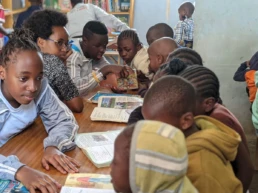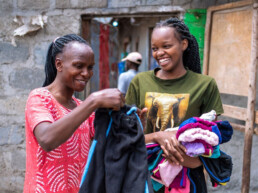The Challenge
In informal settlements, systemic inequalities prevent individuals and families from achieving economic stability. Residents often lack access to fair markets, public services, and financial tools, leaving them trapped in survival mode. Income inequality is stark, with the richest 10% of the population earning 23 times more than the poorest 10%. Women face additional barriers, earning 42% less than men and having limited access to economic opportunities.
Traditional banks and financial institutions often exclude marginalized groups due to high fees and restrictive requirements, while youth unemployment—twice the national average of 12.7%—poses significant challenges for a population where 80% are under 35. These compounded barriers not only undermine individual well-being but also prevent communities from leveraging their full potential for economic growth and development.
The Solution
SHOFCO’s approach to economic empowerment is grounded in addressing systemic barriers and creating opportunities that enable individuals and communities to achieve long-term stability and independence. By integrating health, education, financial tools, and community leadership, we foster resilience, unlock potential, and promote inclusive growth. Here’s how we build economic empowerment:
- Health and well-being: SHOFCO’s community-based clinics provide affordable, high-quality healthcare, including maternal and mental health support, HIV treatment, and care for survivors of sexual and gender-based violence (SGBV). Healthy individuals are more productive, resilient, and able to focus on opportunities rather than survival. Investments in clean water and sanitation infrastructure further reduce health risks, freeing up time and resources for economic activities, particularly for women and girls.
- Skills and knowledge: through education and vocational training, SHOFCO equips individuals with the skills they need to succeed. Our schools provide free, high-quality education, focusing on life skills, leadership development, and resilience for girls and young women. Vocational programs offer practical training in areas like tailoring, carpentry, and business planning, enabling participants to gain employment or start their own enterprises. These initiatives ensure individuals have the tools to transition from survival mode to sustainable livelihoods.
- Financial literacy and access to capital: the SHOFCO SACCO, the first community-based savings and credit institution aimed at supporting the informal economy, provides a variety of financial products, with a specific focus on women and young people. Financial literacy training complements this by teaching participants how to manage money effectively, plan for the future, and achieve financial independence.
- Empowering women: SHOFCO places a special emphasis on empowering women and other vulnerable groups through tailored initiatives like the SHOFCO Women’s Empowerment Program (SWEP). Participants receive training in crafting, business management, and sales, creating marketable goods while becoming part of a supportive sisterhood that fosters resilience and healing. By addressing systemic inequalities and creating safe spaces, these programs enable women to build independent, sustainable futures.
- Community leadership and engagement: the SHOFCO Urban Network (SUN) mobilizes community leaders to address barriers to economic participation, from advocating for better infrastructure to creating opportunities for collective savings and investment. This grassroots leadership ensures that economic empowerment reaches every corner of the community.
The Outcomes
Short-Term
- Families have access to savings, loans, and healthcare, addressing immediate needs and stabilizing household finances.
- Women generate income through small businesses, reducing dependence and building self-reliance.
- Youth gain employability skills and enter the workforce with greater confidence.
Medium-Term
- Communities experience reduced income inequality and increased access to sustainable employment opportunities.
- Women-led businesses grow, creating additional jobs and fostering local economic development.
- Schools and health clinics serve as anchors for community resilience, promoting long-term health and education outcomes.
Long-Term
- Informal settlements transform into hubs of economic activity, driven by empowered individuals and thriving businesses.
- Financial systems become more inclusive, with residents accessing credit and savings to support intergenerational stability.
- Women and youth hold leadership roles in business and civic spaces, driving systemic change and equitable growth.
The Impact
82%
conversion rate from skilling to meaningful and dignified employment
31,564
young women trained and supported through SWEP (2024)
18,340
SACCO members


